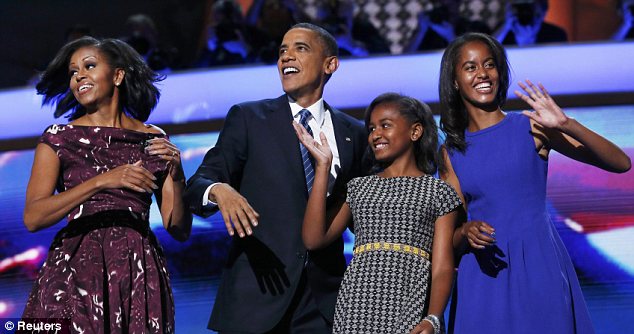Barack Obama has accepted the nomination of the Democratic party, telling voters they face a generational choice in November’s election.
The US president highlighted the differences between his aims and Republican policies, and reprised his 2008 theme of “hope”.
“I never said this journey would be easy, and I won’t promise that now,” Barack Obama told the Democratic convention.
Republican Mitt Romney is challenging Barack Obama for the White House, with polls showing a tight race.
Barack Obama told delegates in the hall and voters watching at home that the nation’s problems had built up over decades and could not be fixed in a flash.
“But when you pick up that ballot to vote – you will face the clearest choice of any time in a generation.
“Over the next few years, big decisions will be made in Washington: on jobs and the economy; taxes and deficits; energy and education; war and peace – decisions that will have a huge impact on our lives and our children’s lives for decades to come,” he said.

Barack Obama took the stage not in a huge stadium in downtown Charlotte, North Carolina, as organizers had hoped, but inside the convention centre after Thursday’s speech was moved because of weather concerns.
He followed a rousing speech by Vice-President Joe Biden, who praised Barack Obama for his bravery in bailing our the auto industry and ordering the killing of Osama Bin Laden.
The president offered a string of critiques of Republican policies, describing his opponents as “happy to talk about everything they think is wrong with America” without offering suggestions on how to make things right.
“That’s because all they have to offer is the same prescription they’ve had for the last 30 years,” he said.
“Have a surplus? Try a tax cut. Deficit too high? Try another. Feel a cold coming on? Take two tax cuts, roll back some regulations, and call us in the morning!”
But there was no mention of his own healthcare law, a signature achievement that remains unpopular with many Americans, and little explicit talk of the stimulus enacted in his first months in office.
The speech prompted a response from Mitt Romney’s camp: “Tonight President Obama laid out the choice in this election, making the case for more of the same policies that haven’t worked for the past four years,” his campaign said in a statement after the speech.
“He offered more promises, but he hasn’t kept the promises he made four years ago.”
Barack Obama also spoke about his energy strategy, saying the US had opened “millions of new acres for oil and gas exploration… and we’ll open more”.
“But unlike my opponent, I will not let oil companies write this country’s energy plan, or endanger our coastlines, or collect another $4 billion in corporate welfare from our taxpayers.”
On international issues, the president described Mitt Romney and running-mate Paul Ryan as “new to foreign policy”.
“But from all that we’ve seen and heard, they want to take us back to an era of blustering and blundering that cost America so dearly,” he said, highlighting his success with Bin Laden and his withdrawal of troops from Iraq and planned drawdown from Afghanistan.
As Barack Obama finished the speech, he roused the crowd by telling them their votes had helped make the changes of his presidency.
“Only you have the power to move us forward,” he said.
“I recognize that times have changed since I first spoke to this convention. The times have changed – and so have I. I’m no longer just a candidate. I’m the president.”
Earlier, Vice-President Joe Biden accepted his own re-nomination in an emotional speech that focused on family and national security.
“Folks, I’ve watched him,” he said of the president.
“He never wavers. He steps up.”
“He asks the same thing over and over again: How is this going to work for ordinary families? Will it help them?”
Joe Biden also criticized Mitt Romney for not backing the US auto industry bailout, referring to the former Massachusetts governor’s time leading private equity firm Bain Capital.
“I just don’t think he understood what saving the automobile industry meant, to all of America. I think he saw it the Bain way, in terms of balance sheets and write-offs,” he said.
“The Bain way may bring your firm the highest profit. But it’s not the way to lead your country from its highest office.”
The third and final night of speeches in Charlotte also saw former Florida governor Charlie Crist – who was previously a Republican – and Massachusetts Senator John Kerry address the convention.
John Kerry criticized Mitt Romney for surrounding himself with “neo-conservative advisers who know all the wrong things about foreign policy”.
“This is not the time to outsource the job of commander in chief,” the Massachusetts senator said.
Former Arizona Representative Gabrielle Giffords, still recovering from a near-fatal shooting on a meeting with her constituents in 2011, appeared on stage to lead the convention in the pledge of allegiance.
Walking slowly and steadying herself to recite the pledge, Gabrielle Giffords left many in the crowd dewy-eyed as she smiled through her recital.
Thursday’s speeches brought an end to the Democratic convention, which also headlined speeches from Michelle Obama and former President Bill Clinton.
Barack Obama and Mitt Romney now face two months of relentless campaigning before voters across the 50 states go to the polls on 6 November.
[youtube kKQV9bEcV28]
